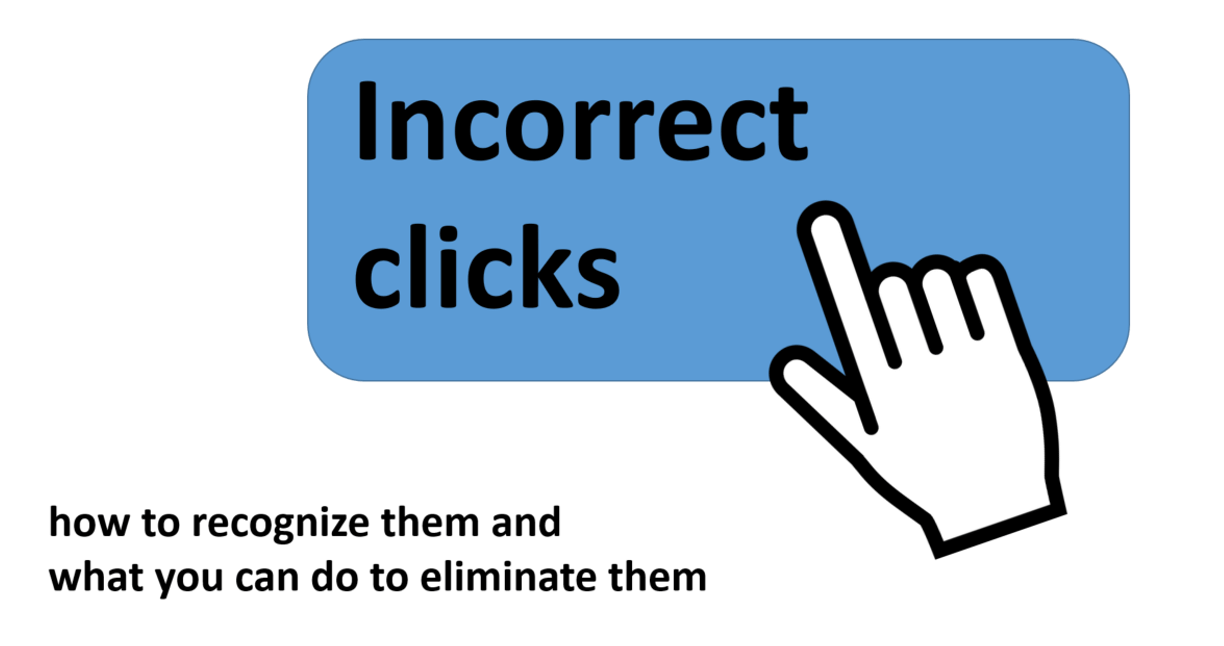Incorrect clicks on Google Ads - how to recognize them and what you can do to eliminate them.

source: own elaboration
Google ads is one of the most popular forms of online advertising. Most online businesses use them to a greater or lesser extent. However, this is a very public form of promotion. We should consider what we are exposing ourselves by paying for keywords. Thanks to the search results, our advertisement will be displayed to the potential client, but also to any other person - the competition, the publisher who will want to increase his commission and the entire range of other people who do not intend to use our offer at all. Unfortunately, we have to pay for clicks regardless of what their effect will be. How to check if the traffic we acquire is good quality?
What should alarm you?
Above all, the price, which in the case of Adwords is dynamically shaped by the market. Of course, price changes can be the result of many factors, but if it increases drastically in a very short time or at the same time as the conversion decreases, it may indicate that someone (or something) artificially increased the number of clicks.
Second, the conversion rate. If you generate significantly fewer conversions with the same amount of traffic or if, despite the increase in clicks, your sales have not increased - you should check if the clicks you obtain are true.
Thirdly, weird user behavior on the site. Google Analytics and traffic analysis on your site will be useful for that. If suddenly a sub-page generates suspiciously many visits or direct entries - it may be a warning for you. Also a lot of visits in short intervals may indicate the operation of the bot.
What can you do about incorrect clicks?
You can eliminate some artificial clicks with the appropriate ad schedule. If you use Google Ads, you know that you typically ads are broadcast 24 hours a day. Of course, it all depends on the industry and the target group, but in most cases this is not the most optimal solution. If you’re worried that some of your clicks may be generated by competitors or dishonest publishers, you can exclude hours that are typical for your business from the schedule (e.g. 8-18). It may not be the most elegant solution, but it is relatively safe - most people buy online in the evenings and on weekends, because at work we rarely have time for it.
The situation is different in the case of automatic scripts, so if your ad’s clicks were generated by Bots. You can try to determine the IP address of such artificial traffic (if it does not change constantly) and exclude it from the campaign (as in the case of internal traffic).
Make sure that your keyword selection is not too wide. This may result in the ad being displayed to the wrong people, thereby affecting more invalid clicks.
Also, check out Keyword and placements reports to always know where your ads appear and what keywords trigger them.
What does Google do about incorrect clicks?
For some time now, Google has been trying to detect "invalid clicks", which means accidental or malicious clicks. The algorithms created by the giant capture some of the clicks that have no value for the advertiser - for example:
- accidentally double clicking an ad at the same time by the same user
- manually operating intentionally increasing costs (increased traffic from one IP or the same location)
- clicks triggered by automated tools, robots and other software with less complex construction
Information about them, especially about how much of the total traffic is "incorrect", can be found in the Adwords account at the campaign view level, selecting an additional column "invalid clicks" from the list and adding it to the main table.
Classifying clicks as "incorrect" by Google means that we will not have to pay for them. This does not mean, however, that we do not incur any costs associated with their services. In addition, the verification process continues and often takes a lot of time. It may turn out that we have already paid for the "artificial" traffic and the money will be returned to us in a while. We should also remember that such incorrect traffic also has a negative impact on statistics, such as, for example, conversion rate.
What if it is not enough?
This solution is recommended to everyone, but above all, to companies operating online on a large scale. A wider spectrum of online activities involves a greater risk of fraud and the need to intensify protection. Remember to choose a company specializing in this area with the right reputation and experience, because the goal is to reduce costs, not to increase them. We can immodestly recommend our services - if you would like to test them - write to us.

